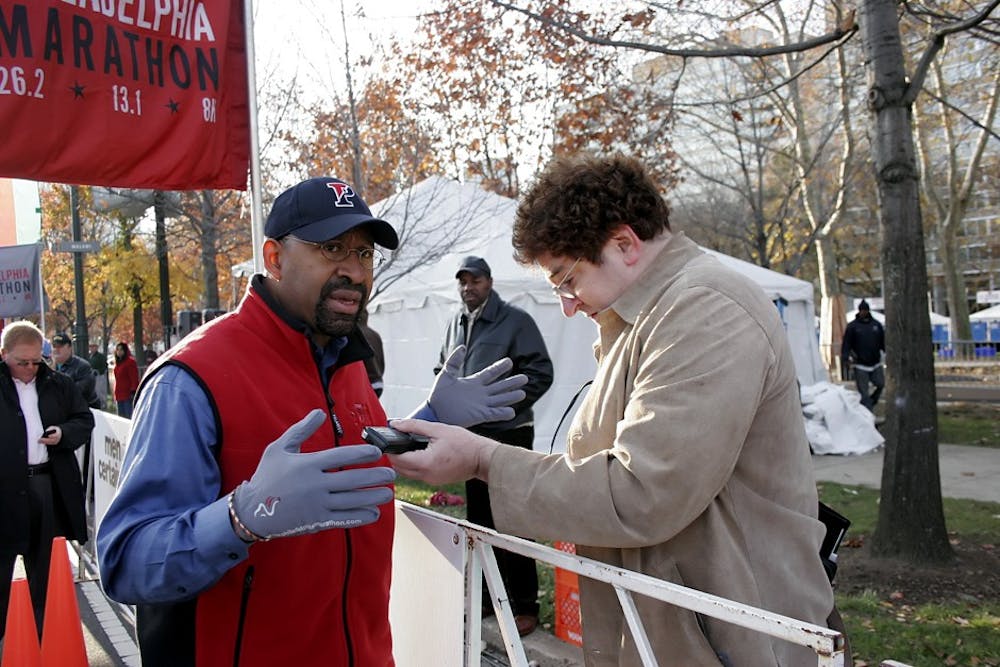
David Block speaks a mile a minute, slightly edging the pace of his first marathon.
Sitting in Penn’s own Philly Diner wearing a T-shirt from a recent 8k run, he can rattle off the information from his mental rolodex of names, dates, times and phone numbers in a heartbeat.
“Sunday, Nov. 11th, 1979, I ran that marathon in three hours, 40 minutes and 23 seconds,” he recalls.
Block has since run eight more, but none in the last decade. The knee surgery in 2002 relegates him to the treadmills of Ardmore’s YMCA.
“I still run,” he says. “But I’m slower than a paralyzed turtle.”
Running has been much of his livelihood, since freelance writing for Runner’s World at the beginning of his career, to today’s Penn Relays, where Block has been a yearly fixture for a decade now as a reporter for the Main Line Times.
But running has also been therapy, a way to cope with the frustration of his work and everyday life.
Block is legally blind.
Born with congenital cataracts, doctors removed both his lenses as a child because his sight was completely opaque — now he has 20/200 vision.
And while Block can’t track an athletic competition like a fully-sighted reporter, he’s never run from his passion as a writer and an educator, often utilizing his disability as a way to connect with his stories.
He’s covered athletes from Kurt Abbott, who pitched in the major leagues with just one hand, to Joe Frazier, the famous pugilist who boxed with cataracts and a crooked left arm.
Block’s personal favorite article — picked up by the New York Times in 2005 — was about blind roller derby star Sammy Skobel, while his most memorable interview was with Sarah Palin’s parents about their grandson with Down syndrome.
“He has a special feel for those kind of stories,” says Bruce Adams, Block’s sports editor at Main Line. “Having experienced a little [adversity] himself, he can really put himself in the shoes of people that he writes about in that way.”
But don’t try to label Block as some one-dimensional, bleeding-heart author of misfortune and hardship — his wire-rimmed glasses may start to shake.
“Just because I’m blind doesn’t mean I’m the blind person spokesman,” Block said. “I’m a reporter first, I just happen to have found myself writing about people with disabilities.”
Disability or not, Block is drawn to figures in the public eye, and readily admits he relishes the spotlight. The rush, “the high,” he gets from interviewing someone famous and publishing his story is what keeps him going.
Case in point, Block’s first of four interviews with basketball superstar Kobe Bryant during the 2001 NBA finals. Though Block is 15 years senior to the 32-year-old Bryant, the two share a high-school alma mater, nearby Lower Merion.
While Bryant’s Lakers were facing none other than Block’s hometown Philadelphia 76ers for the championship, his allegiance was a no-brainer.
“I was cheering for the Lakers because Kobe gave me an interview,” Block says with pride.
These days it’s no different, and simple as it may sound, Block’s happiness has a compass pointing toward The Penn Relays and directly to its most famous guest, Bill Cosby.
“Sometimes I get more excited about getting a quote from Cosby than covering the Penn Relays,” Block says. “I’ve interviewed him six times.”
“That’s his favorite thing to do every year,” says Chas Dorman, associate director of Penn Athletics Communications.
In 2008, Cosby even challenged Block to a race on even footing — blindfolded.
“He never followed through with it,” Block says. “I would race him if he wanted to. I wouldn’t mind losing to Cosby.”
Though the personal challenge never materialized, Block is a mainstay at The Penn Relays, even last year when his media request somehow wasn’t sent to the University on time.
Dorman — responsible for all media participation at Relays — knew something was missing from the event and reached out to Block at the last minute to secure him a spot.
“With over 300 reporters and photographers, [Block] is somebody we want to make sure is coming,” Dorman says. “He’s made it so much a part of him that I start to associate him as part of my experience at The Penn Relays.”
While Block juggles the responsibility of freelance writing and the exhausting task of fundraising for his latest documentary — oh yeah, he’s won four awards for chronicling U.S. veterans — The Penn Relays is an oasis in his world of thankless work.
“It’s one of the few times I get to cover athletes that aren’t disabled or challenged,” says Block, who focuses his Relays reporting on Villanova University and Main Line high schools. “I love covering The Penn Relays; I live for that in a way — you can quote me.”
For Block, it was never about the money — he’ll tell you he doesn’t have much. It wasn’t about the joy of penning another article — he always preferred fiction to journalism.
It’s the sporting experience for a former athlete, the thrill of meeting someone famous and the subsequent publication.
The Penn Relays combine it all.
And you can bet there will be a few folks waiting to speak with Block when he’s at Franklin Field this year.
“Ask Bill Cosby, ‘Do you know who that half-blind reporter is who walks up to you during The Penn Relays with a blind man’s cane, holding onto a volunteer asking for 30 seconds of his time?’,” Block says.
“Then he’ll probably remember.”
The Daily Pennsylvanian is an independent, student-run newspaper. Please consider making a donation to support the coverage that shapes the University. Your generosity ensures a future of strong journalism at Penn.
DonatePlease note All comments are eligible for publication in The Daily Pennsylvanian.





